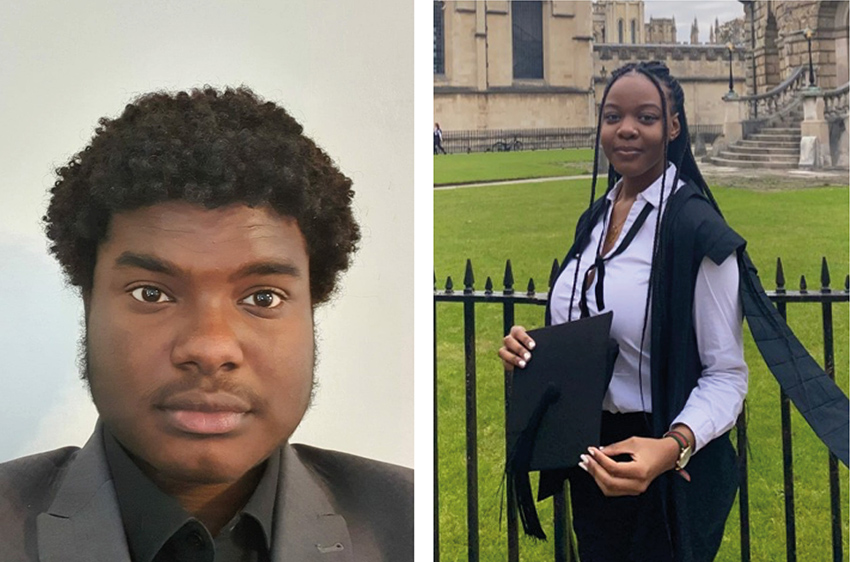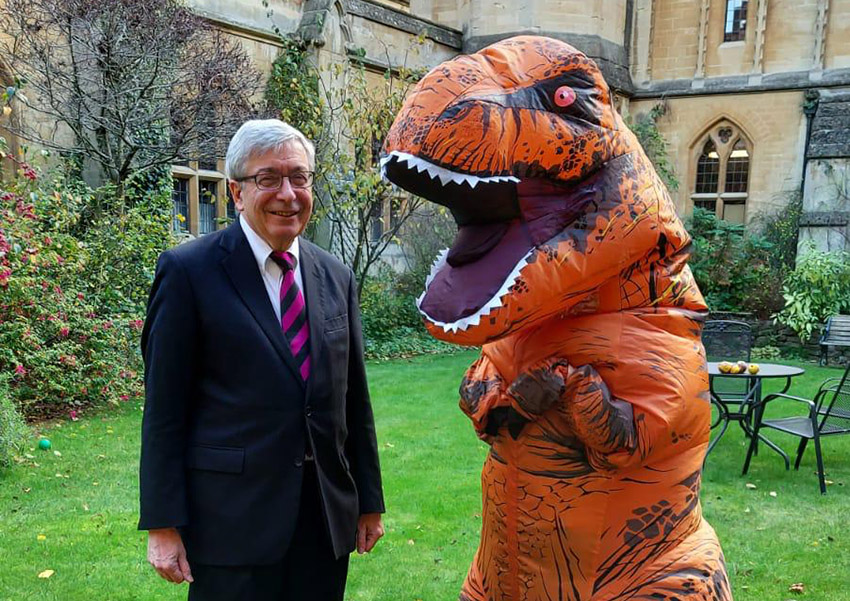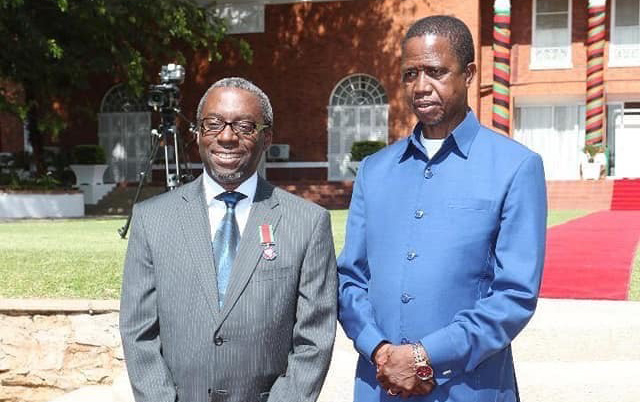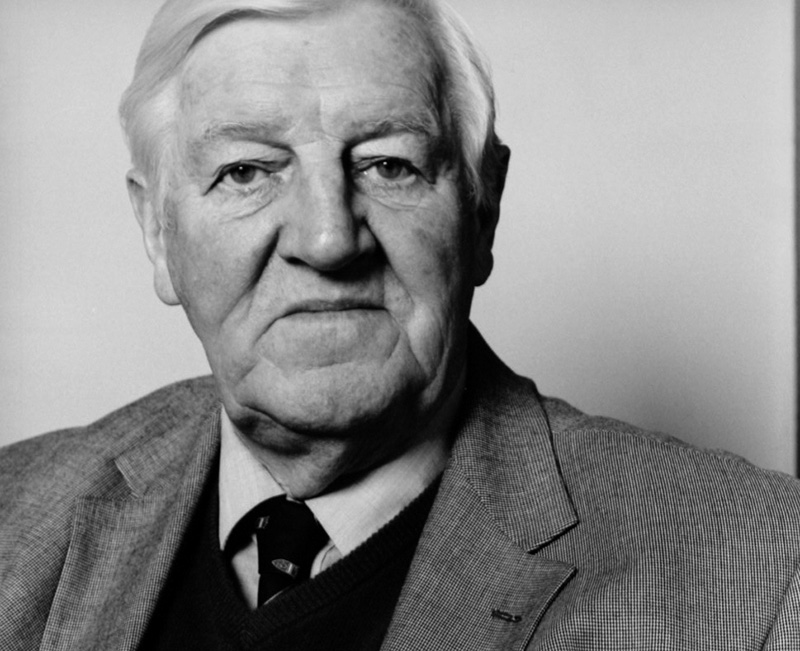Rector Trainor looks back at events of Michaelmas Term 2020
Michaelmas, Exeter’s (and the University’s) first in-person pandemic term, proved challenging in many ways. Yet, from the perspective of mid-December, the term seems far more successful than otherwise, in part because it included many continuities with its non-pandemic predecessors.
Admittedly the contrasts with normality have been many. Undergraduate freshers were assigned particular days for arrival, making it easier for new students and parents alike to observe social distancing during the moving-in process. Of more enduring significance, undergraduates and resident postgraduates were assigned to ‘households’ of about half-a-dozen people each within which, to conform with Government regulations, most social interaction had to take place. A heated marquee, containing carefully spaced tables of appropriate length, appeared in Front Quad, facilitating safely distant conversations and study sessions. Approved places in Hall were carefully marked, with Plexiglas screens down the central table and High Table. Socially distant places were also designated in the Library, where (as in University libraries) study sessions were pre-booked. Tutors and students had to decide whether tutorials would occur in person or online. Students experiencing Covid-like symptoms were directed to the University-run Early Alert Service for tests.
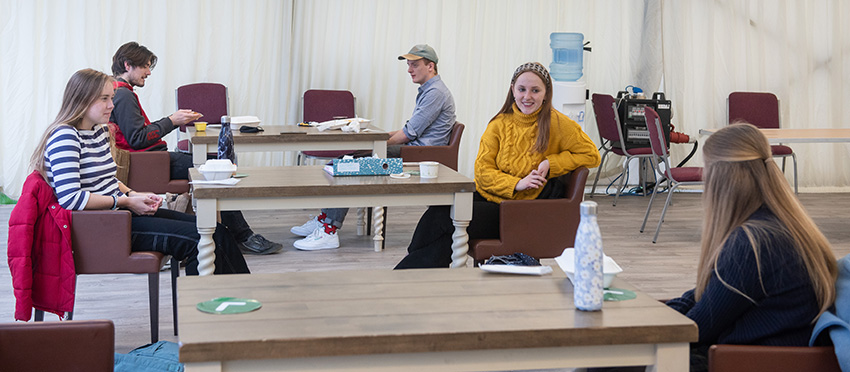
Students have been able to socialise at a safe distance in the heated marquee. Photo by John Cairns
Students who had to self-isolate had meals brought to their rooms by College staff and books fetched from the Library by student volunteers. Support for the College’s Welfare Team was increased to ensure adequate welfare provision. Then, compounding complexity, the Government moved Oxford to Tier 2 of its regulatory regime, only days before the second national lockdown led to yet another change of regulations.
Yet Exeter quickly adapted to these fast-moving events, aided by the weekly meetings of the Covid-19 Action Group, which was fortified by student representation. The term evidently was an academic success, and on the whole students seemed very glad that, in contrast to Trinity Term, the Michaelmas regime allowed them to return to Oxford. Many tutors reported that the promptness and quality of written work were at least as good as in normal times.
Happily, there was more to Michaelmas Term at Exeter than testing and work. Both the MCR and the JCR proved ingenious at holding online social activities. Socially distanced Chapel services, with remarkably good singing by a masked choir, had to give way once the lockdown began to recorded services, but the latter attracted a wide audience online. Socially distanced freshers’ dinners for undergraduates and postgraduates – five for each, with the capacity of the dining hall reduced to less than a fifth of its usual number to allow at least two metres between people – were held in October. Also, although Diwali, Thanksgiving and Christmas dinners could not take their usual communally festive form, themed meals were served on each occasion on a takeaway basis, complete with would-be inspirational messages! There was also an online formal for our international students, with the Polish theme chosen by students and enthusiastically embraced by our catering team. And Exeter participated vigorously in the national symptomless testing programme, in late November and early December, that allowed many students to go home for the Christmas Vacation without fear of infecting their families.
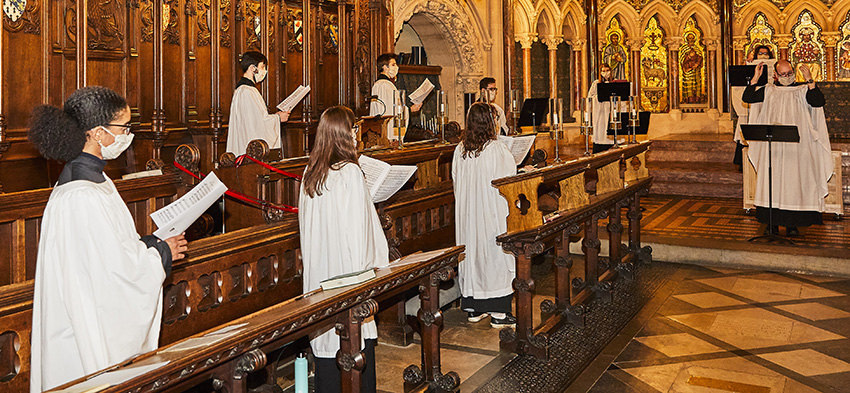
The Choir wore face masks during rehearsals and performances
Likewise, although many social, sporting and other extracurricular activities had to be postponed or moved online, Michaelmas Term produced successes as well as frustrations beyond formal study. A triumphant example was the participation of graduate student Nick Saunders (2019, EMBA) in Oxford’s Varsity golf victory. Regarding undergraduates, two Exeter freshers had featured roles in the University’s ‘Black History Month 100’. Amgad Salih (2020, Economics and Management) was praised for having co-founded the Black Excellence Network, a mentorship scheme for aspirational black students going into higher education; Deborah Ogunnoiki (2020, Classics) was nominated for her work setting up an African and Caribbean Society at her secondary school. Research student Jonas von Hoffmann (2015, Politics) published an article on the legalisation of marijuana use in Uruguay, while fellow D.Phil. candidate Corinne Cath-Speth (2016, Information, Communication & Social Sciences) jointly produced How the Internet Really Works: an illustrated guide to protocols, privacy, censorship and governance (No Starch Press).
Amgad Salih and Deborah Ogunnoiki
I’m also pleased to report that, although a great deal of attention has had to be devoted to adjusting Exeter’s operations to the pandemic, College business has been moving forward on various other fronts. Most importantly, the College welcomed its new Finance & Estates Bursar, Nicholas Badman ACA, a product of PPE at Oriel who since graduating has been an Army officer and, for many years, has worked in a variety of roles in the City. Nick has quickly immersed himself in Exeter’s finances. Also, the Governing Body has given preliminary approval to updated statutes which are now out for consultation with the relevant authorities. In addition, the College has made an increased commitment to communications, both external and internal. Because of further work during Michaelmas Term, plans for the restoration and renovation of the College Library are ready for a final decision in January on submitting the designs for planning and listed building approval. Outreach activities are being pursued as vigorously as the enforced online format will permit. Similarly, admissions interviews are under way – online.
Our alumni activities have continued vigorously, albeit still in the virtual format they have had to adopt since March. Since I last reported there have been four Exeter Webinars, by: Professor Conall Mac Niocaill (Tutor for Undergraduate Admissions) on ‘Oxford Admissions Explained’ (15 October), Professor Joseph Nye (1998, PPE) on ‘Do Morals Matter? The American Election and Donald Trump’ (29 October), David Webb (1983, Mathematics) on ‘Were the Lockdowns Worth the Socio-economic Cost?’ (4 December), and Dr Dexnell Peters (Boskey Fellow in Atlantic History) on ‘Race and Politics in the Greater Caribbean during the Revolutionary Era’ (30 October). Similarly, the Lyell Society, Exeter’s earth sciences community, held a lively online event on 14 November including brief talks from five recent alumni. Five days later many Exonians responded generously to the College’s first ever Giving Day, which raised over £50,000 and attracted almost 400 donors, especially (though by no means only) from relatively recent graduates. There was an online pet competition, and a student disguised as the dinosaur T-REXeter provided light relief in College on the day. And as term ended a telethon took place; student callers, albeit physically separate from each other and from their coordinators, managing to ring many Exonians.
The ‘T-RExeter’ proved a popular mascot for Exeter’s first ever Giving Day
Michaelmas was, as usual, a term for alumni achievement. An illustrious example was the conferring of Zambia’s highest civilian honour on Kenneth Mwenda (1992, BCL), a long-serving high official of the World Bank. Similarly, Mavis Chionh (1988, Jurisprudence) was appointed as a High Court judge in Singapore. Also during the term, David Thomas (2008, PPE) was awarded an OBE for his work in founding the Oak National Academy which has provided free online lessons for school pupils during the pandemic. Meanwhile, the College nominated Chisanga Puta-Chekwe (1977, PPE) for special attention during the University’s observance of Black History Month for his extraordinary efforts to help children from low-income families receive post-secondary education. Meanwhile, Zerlina Vulliamy (2017, Music) overcame the constraints that Covid-19 has imposed on the performing arts by launching an online series, Opera in Conversation, in connection with her new organisation Oxford Contemporary Opera.
Professor Kenneth Mwenda (left) is awarded the Presidential Insignia of Meritorious Achievement by Zambian president Edgar Lungu
I’m also very pleased to note a number of alumni who have published recently: Michael Geoghegan (1974, Modern Languages) for The Ruins of the Reich: Travels in Germany Past and Present (Leitmotif); Nicholas Royle (1976, English) for Mother: A Memoir, a study of parents and children; Professor Henry Summerfield (1956, English) for From Family to Philosophy: Letter-Writers from the Pastons to Elizabeth Barrett Browning (University of Victoria Libraries); Professor Richard Taylor (1964, PPE) for English Radicalism in the 20th Century: A Distinctive Politics (Manchester); Dr Ursula Hackett (2006, Politics) for Brilliant Essays (Macmillan Study Skills); and, not least, Amanda McDonald (1991, English) for The Miracle Lady, which describes her recovery following a terminal cancer diagnosis.
As ever, Exeter’s Fellows distinguished themselves during the term. Dame Carol Robinson (Dr Lee’s Professor of Chemistry), received an honorary doctorate from the Weizmann Institute of Science and secured the role of inaugural director of the Kavli Institute for NanoScience Discovery. Professor Garret Cotter (Physics) obtained the University’s Recognition of Distinction. Professor Neil Herring (Pre-clinical Medicine) received both a Senior Clinical Research Fellowship and a Project Grant from the British Heart Foundation. Professor Giuseppe Marcocci (History) published with OUP The Globe on Paper: Writing Histories of the World in Renaissance Europe and the Americas. Professor Jonathan Herring (Law) published Domestic Abuse and Human Rights (Intersentia). He also co-edited Women’s Birthing Bodies and the Law (Hart), to which he contributed a chapter. Alvyn Pettersen (former Chaplain and former Visiting Fellow) published The Second-Century Apologists (Cascade). Moreover, Fellows have begun collaborating with students on a series of Race Equality Seminars. On a sad note, I have to report the death, on 7 October, of Emeritus Fellow Professor Peter Sleight; joining the Exeter Fellowship in 1973, he began a highly distinguished tenure of the Field Marshall Earl Alexander Chair of Cardiovascular Medicine. We shall miss Peter’s enthusiastically genial yet very modest presence.
Emeritus Fellow Professor Peter Sleight sadly passed away at the start of Michaelmas Term
Despite the challenges of this pandemic term, the Exeter community pulled together as it has done since Covid-19’s unwelcome arrival. From tutorial diligence to student cooperation to extra effort by staff to enthusiastic attendance at webinars, the response has been terrific – an excellent sign for 2021. Some time in the new year we hope, of course, that the new vaccines – including the Oxford version to which Exeter Fellow Professor Cath Green has made a major contribution – will allow us to resume the normal rhythms both of College alumni life and of Exeter activities more generally. Meanwhile, there is daily evidence of another positive pointer for the future: Walter, the new College cat, has adjusted to the return of students, passing his days in the relative tranquillity of the Rector’s Garden but venturing out for special events such as the Choir’s concert of Christmas carols in Front Quad in 8th week!
